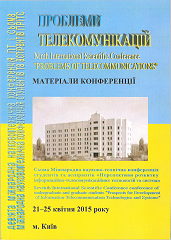СЕРЕДА ОЦІНЮВАННЯ ДОСВІДУ РОБОТИ З АДАПТИВНИМИ СИСТЕМАМИ КІНЦЕВОГО КОРИСТУВАЧА
Анотація
An Evaluation Framework for End-user Experience in Adaptive Systems
The evaluation of adaptive and personalised systems is a difficult, complicated and very demanding endeavour due to the complex nature of these systems and the usability issues encountered. This demonstration introduces a web-based framework to support the evaluation of end-user experience in adaptive and personalised systems. This framework has been developed based upon advice from domain experts and a review of evaluation approaches, methodologies and techniques adopted by existing adaptive systems. The benefits of the framework include: i) the provision of an interactive reference and recommendation tool to encourage the evaluation of adaptive systems; ii) the collaborative nature of the framework facilitates the sharing of evaluation information among researchers from diverse communities; iii) the identification of pitfalls in the planning process as well as in data analysis; and iv) the translation of presented information into users language of choice.
Посилання
E. Knutov, et al., "AH 12 years later: a comprehensive survey of adaptive hypermedia methods and techniques," New Review of Hypermedia and Multimedia, vol. 15, pp. 5-38, 2009.
C. Gena and S. Weibelzahl, "Usability engineering for the adaptive web," The Adaptive Web, pp. 720-762, 2007.
De Jong, et al., "Reader-focused text evaluation. An overview of goals and methods.," Journal of Business and Technical Communication, vol. 11, pp. 402-432, 1997.
D. Dagger, et al., "Personalisation for all: Making adaptive course composition easy," Educational Technology & Society, vol. 8, pp. 9-25, 2000.
##submission.downloads##
Як цитувати
Номер
Розділ
Ліцензія
Авторське право (c) 2017 Лариса Сергіївна Глоба, Катерина Сергіївна Баскенова, Ріна Леонидівна Новогрудська

Ця робота ліцензується відповідно до Creative Commons Attribution 4.0 International License.
Authors who submit to this conference agree to the following terms:a) Authors retain copyright over their work, while allowing the conference to place this unpublished work under a Creative Commons Attribution License, which allows others to freely access, use, and share the work, with an acknowledgement of the work's authorship and its initial presentation at this conference.
b) Authors are able to waive the terms of the CC license and enter into separate, additional contractual arrangements for the non-exclusive distribution and subsequent publication of this work (e.g., publish a revised version in a journal, post it to an institutional repository or publish it in a book), with an acknowledgement of its initial presentation at this conference.
c) In addition, authors are encouraged to post and share their work online (e.g., in institutional repositories or on their website) at any point before and after the conference.

